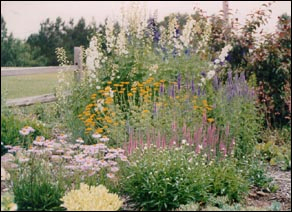 Mulch your newly planted garden 2″-4″ to retain moisture, even temperature, add nutrients, make soil more porous, prevent water run off and prevent the soil from cracking.
Mulch your newly planted garden 2″-4″ to retain moisture, even temperature, add nutrients, make soil more porous, prevent water run off and prevent the soil from cracking.
Water your garden evenly. Surface watering is best. New plants require more frequent watering. Keep in mind over watering kills more than drought.
Fertilize your garden as needed. Use a fertilizer such as 10-10-10 or 21-8-18
Stake plants that need assistance in standing upright. As some varieties grow to their mature height, they can become top heavy and start to fall over. If this is the case, there are many types of stakes you can use to help erect these plants.
Insects & Pests can cause problems in your garden. If they are eating your plants foliage or damaging the crowns and roots, you need to get rid of them. Keep your garden clean of debris, choose species that are resistant to insects and pests, use insecticidal soaps or pyrethrins
 Diseases on plants can be minimized by planting resistant species, irrigating at soil level in the morning, increasing air circulation around plants and keeping plants stress free. If diseases appear you can use fungal sprays. A safe fungal spray recipe is 1 teaspoon baking soda, 1 quart water and a few drops of dish soap.
Diseases on plants can be minimized by planting resistant species, irrigating at soil level in the morning, increasing air circulation around plants and keeping plants stress free. If diseases appear you can use fungal sprays. A safe fungal spray recipe is 1 teaspoon baking soda, 1 quart water and a few drops of dish soap.
Weed control – Make sure your beds are free of weeds before planting. After planting you can use pre-emergance to help prevent weeds along with mulching. It is important to keep a weed free garden to eliminate any new weed growth.
Deadheading (removing spent flowers) is a process by which you can control the spread of seeds after a flower has bloomed. The pinching off of the seed head will keep it in its place. Pinching off a spent flower head can also encourage a plant to produce more blooms.



